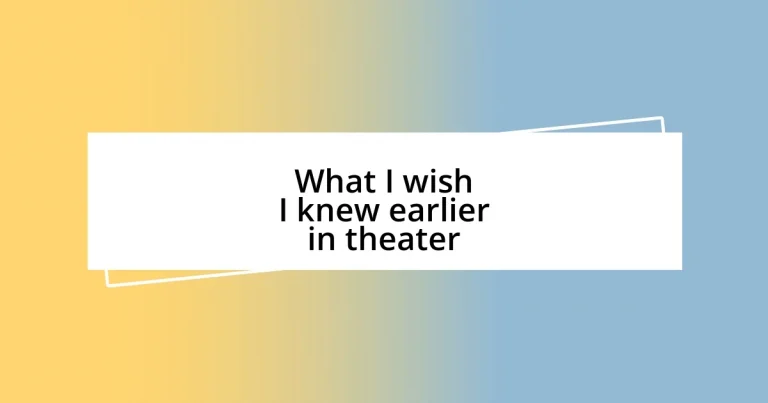Key takeaways:
- Understanding the fundamentals of theater, including scripts, staging, and collaboration, is crucial for enhancing performances and deepening emotional connections to the art form.
- Embracing constructive criticism and the rehearsal process can lead to significant personal growth and improved performances, turning feedback into a shared learning experience.
- Networking and building a strong support system are essential for navigating the theater industry, opening doors to opportunities, collaboration, and emotional support.
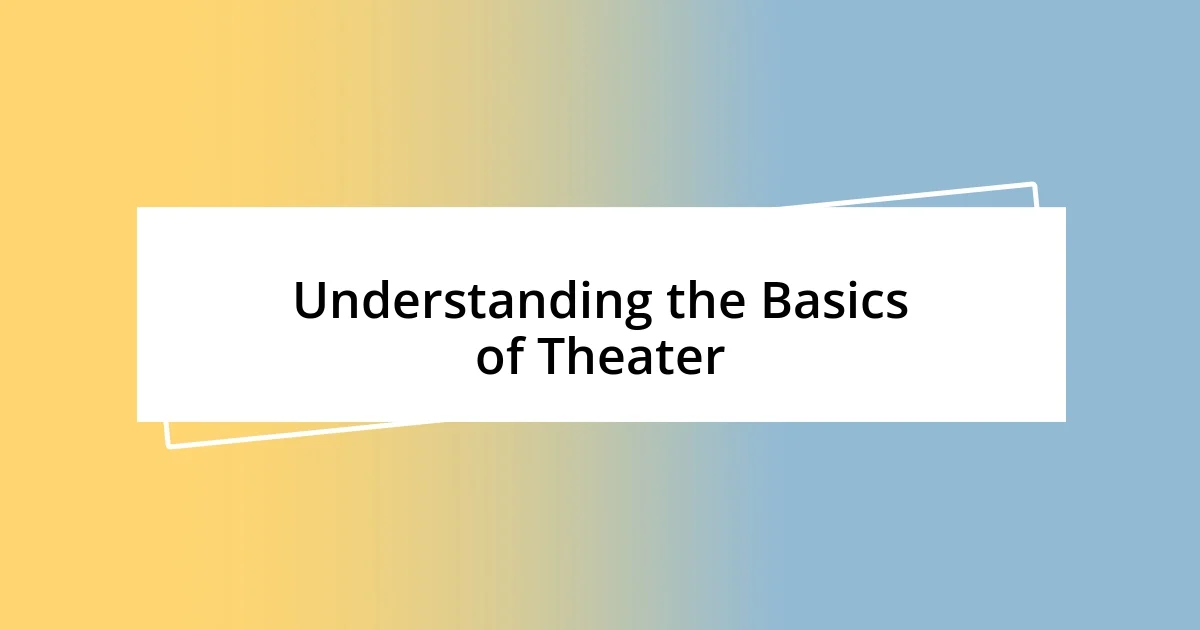
Understanding the Basics of Theater
From my early days in the theater, I learned that understanding the basics is essential; it’s like the foundation of a house. The importance of scripts, staging, and characters became apparent to me during rehearsals when we first stumbled over blocking. Have you ever tried to visualize a scene without a clear plan? It’s chaos!
In my experience, observing how each element plays a role can truly transform a performance. For instance, when I was cast in my first production, I had no idea how much the lighting impacted the mood of a scene until I saw the difference it made in rehearsal. Suddenly, the same lines felt entirely new when illuminated in different ways. Isn’t it fascinating how something as simple as light can alter our perceptions?
As I continued to delve deeper, I realized that theater is about collaboration. Every actor, director, and crew member brings a unique perspective to the table. I remember a moment when a prop design totally changed my character’s motivation, revealing layers I hadn’t even considered. How often do we overlook the tiny details that ultimately create the heart of the story? Embracing these basics not only enriches our understanding but also deepens our emotional connection to the art form.

Exploring Key Acting Techniques
Learning key acting techniques can truly shape your performance in unique and surprising ways. One of the most profound lessons I’ve absorbed is the art of emotional memory. This technique involves drawing from your own life experiences to fuel your character’s emotions. I recall a time when I channeled a personal loss into a scene; it led to an authenticity that deeply affected both me and the audience. Have you ever felt a character resonate with your own story? The connection is powerful!
Another technique that transformed my approach is improvisation. Initially, the idea of thinking on my feet was terrifying. But during an improvisational workshop, I discovered that spontaneity can lead to genuine moments on stage. I recall a hilarious incident where I accidentally dropped a prop, and instead of panicking, I integrated it into the scene. The audience’s laughter was reaffirming, reminding me that sometimes, what isn’t planned can become the most memorable.
Voice modulation is essential, too. I remember rehearsing a monologue and feeling flat because I was too focused on memorizing lines. But once I started playing with pitch and pace, my performance changed. I discovered how vocal variety can breathe life into a character. Have you ever noticed how a single line can sound entirely different based on delivery? It shows just how much power your voice holds in conveying emotions and narratives.
| Acting Technique | Description |
|---|---|
| Emotional Memory | Using personal experiences to evoke genuine feelings in character performance. |
| Improvisation | Spontaneous acting that encourages authenticity and creativity on stage. |
| Voice Modulation | Varying pitch and pace to enhance emotional delivery and character depth. |
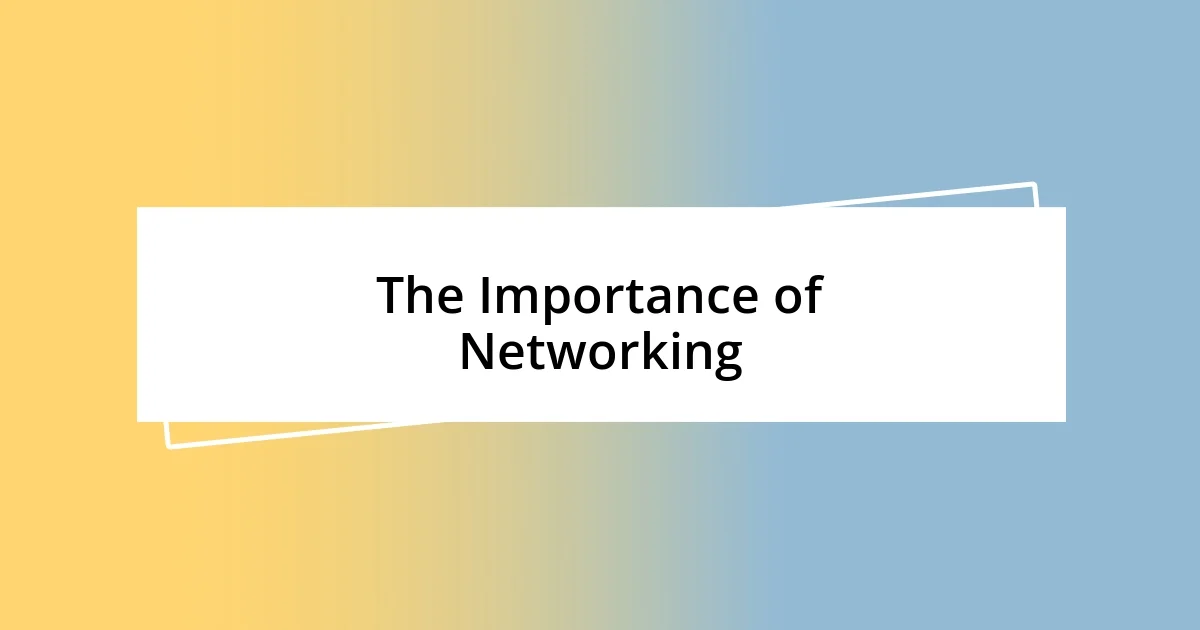
The Importance of Networking
Networking in theater is something I wish I had grasped earlier. The connections I made over the years have not only opened doors but also enriched my understanding of the craft. I remember attending a small showcase where I met a lighting designer. That chance encounter led to collaborative projects that transformed my approach to performances. It’s incredible how one conversation can pivot your career and creative journey.
Building relationships in this industry can be as vital as honing your skills. Here are some benefits I’ve noticed:
- Opportunities for Collaboration: Engaging with other theater professionals often leads to creative partnerships that can enrich both parties’ work.
- Learning from Others: I’ve gained invaluable knowledge simply by being in the presence of experienced artists willing to share their expertise.
- Staying Informed: Networking helps you stay updated on upcoming auditions, workshops, and events that might not be widely advertised.
- Emotional Support: The theater can be a tough field, and having a network gives you a community to turn to for encouragement and advice.
- Building a Reputation: Word of mouth is powerful. Being good at what you do while being a supportive colleague can enhance your reputation within the community.
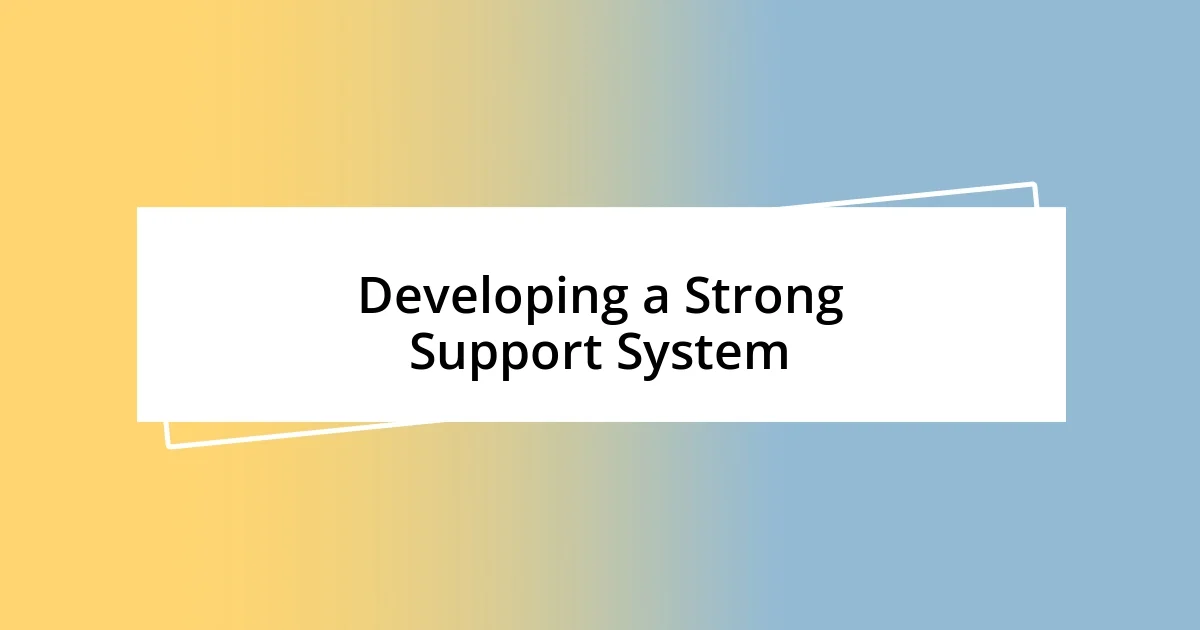
Developing a Strong Support System
Developing a strong support system in theater is something I truly value. When I first started, I had no idea how crucial it was to surround myself with people who understood the ups and downs of this demanding field. I vividly remember a time when I was stressed about an audition; a fellow actor took the time to listen, share their own struggles, and offer advice. That moment reminded me how much easier this journey feels when you’re not alone.
Creating a supportive environment isn’t just about having friends; it’s about building relationships that uplift and challenge you. I still cherish the late-night discussions with my close theater friends, where we dissect our performances and share constructive feedback. Have you ever left a conversation with someone and felt more energized and inspired? Those moments can spark creativity and push you to explore different facets of your craft.
Additionally, finding mentors can be a game-changer. I was fortunate enough to connect with a seasoned director who once invited me to shadow her during rehearsals. That experience opened my eyes to the intricacies of directing and reinforced how valuable guidance can be in shaping your artistic vision. It made me realize that being part of a community isn’t just about camaraderie; it’s about continuous growth and learning from one another.
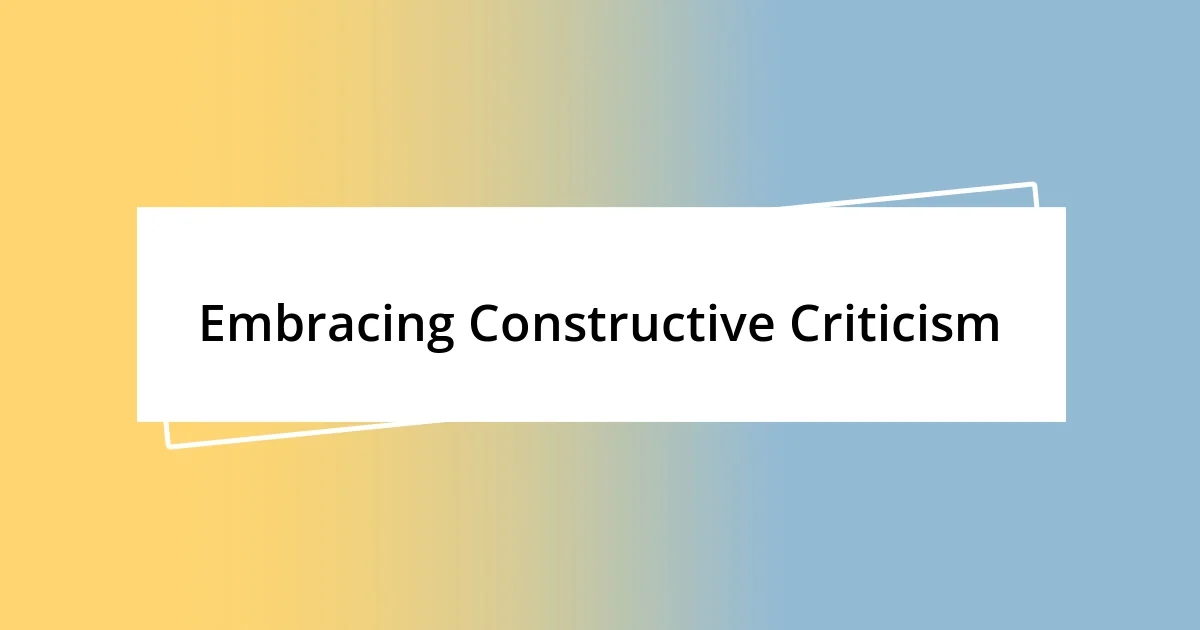
Embracing Constructive Criticism
Embracing constructive criticism was a lesson I learned the hard way. In one of my early performances, I was devastated by feedback from a director who told me my character lacked depth. At first, I felt defensive and questioned my talent. But reflecting on their words, I realized they were the key to growth. This critique pushed me to dig deeper into my character’s motivations and ultimately transformed my performance.
I recall a rehearsal where a fellow actor pointed out that my delivery felt a bit flat during an emotional scene. Instead of feeling attacked, I chose to see it as a chance to improve. I took their advice to heart during our next run-through, and the intensity that emerged surprised both of us. Have you ever had a moment when criticism led to a breakthrough? That experience taught me that feedback can be a powerful tool if you’re willing to listen and adapt.
It’s essential to foster an environment where criticism is seen as constructive and not personal. When I started intentionally seeking feedback from trusted colleagues, I noticed a shift. Instead of waiting for comments during performances, I’d ask specific questions: “What did you think about my pacing?” or “Did my character arc feel authentic?” This approach not only strengthened my performances but also deepened my relationships with fellow actors. Embracing feedback became a shared experience, making our creative process richer and more rewarding.
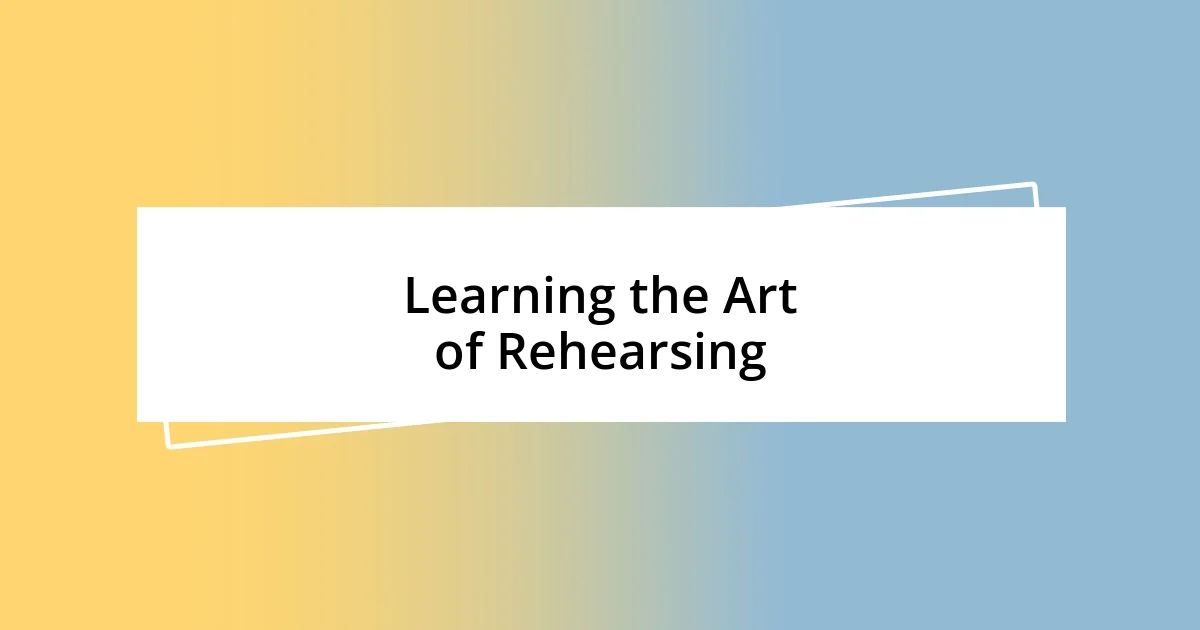
Learning the Art of Rehearsing
Learning the art of rehearsing is a journey that goes beyond simply memorizing lines. I remember a particularly challenging scene where my nerves turned my performance into a robotic recitation. It wasn’t until I embraced the rehearsal process, focusing on character choices rather than just the words, that my portrayal blossomed into something genuine and compelling. How often do we forget that rehearsal is our playground to experiment and grow?
The magic truly happens during those moments of exploration in rehearsal, where collaboration with fellow actors can spark incredible creativity. One time, during a group rehearsal, my scene partner and I decided to improvise a backstory for our characters that completely transformed the dynamic between us. Suddenly, our interactions became alive with authentic emotion. Have you ever experienced that exhilarating moment when a simple change leads to a breakthrough in your performance?
It’s crucial to enter each rehearsal with an open mind and a willingness to learn. I found that being receptive to the spontaneity that can arise allowed me to discover new layers to my character. Of course, it’s not always easy, especially on days when self-doubt creeps in. But I’ve learned that acknowledging those feelings and pushing through can lead to the most rewarding discoveries. In a way, isn’t that the essence of theater? Embracing the unpredictable journey of the rehearsal process can elevate not just our performances, but also our love for the craft.

Navigating Auditions and Opportunities
When it comes to navigating auditions, I wish I had grasped earlier how much preparation matters. I remember walking into auditions thinking that just knowing my lines was sufficient. However, I soon realized that it’s about embodying the character deeply and connecting with the material. Have you ever walked into an audition feeling unprepared? That uneasy feeling can sometimes outweigh the excitement of performing.
Opportunities in theater often come unexpectedly, and I learned quickly that networking is key. I recall a time when I struck up a conversation with someone backstage at a local production. That casual chat led to an audition for a role I never imagined I’d be considered for. It reinforced my belief that every interaction counts. How often do we underestimate the power of simple conversations? Those moments can open doors to unexpected paths in our theatrical journey.
I also discovered that attending auditions is as much about resilience as it is about talent. There were countless times I faced rejection, and it felt disheartening at first, like I was constantly hitting a wall. But with each “no,” I learned to keep pushing forward and view auditions as opportunities to grow. Wouldn’t it be easier to give up? Yet, I found that embracing rejection as part of the process made each subsequent audition feel less daunting and more like a chance to showcase my evolving self.












